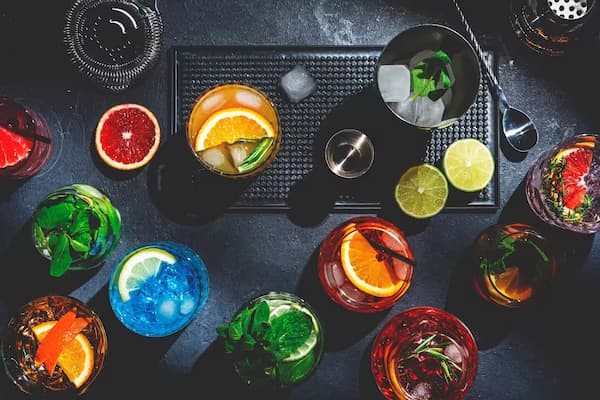Lemon Juice
With Lemon Juice you can make
A delightful pine and herbal infusions
The Stamp
Green Cardamom Pisco, Pino Mugo, Lemon Juice, Blackberry Syrup, Tonic water, Basil leaves
Sky Blue Floral Elegance
Aviation
Gin, Maraschino cherry liqueur, Creme De Violette, Lemon Juice
A sweet and spicy twist awaits
Oliver Twist
Dry gin, Elderflower Liqueur, Lager, Lemon Juice, Honey (A jar of honey to create chilli infused honey. Only 1 tbsp is needed in the cocktail.), Chilli peppers (Added to the honey to create the chilli infused honey.)
Elegance with a floral twist.
Lady Luck
Gin, Elderflower Liqueur, Lemon Juice, Grapefruit Bitters, Pear Nectar
Floral elegance in every sip
Lavender French 75
Gin, Champagne / prosecco, Lemon Juice, Lavender Syrup
Taste the Caribbean in every swizzle
Rum Swizzle
Jamaican rum, Lime juice, Falernum, Angostura Bitters, Lemon Juice, Sugar / simple Syrup
Unexpectedly Potent and Refreshing
Long Island Iced Tea
White rum, Gin, Tequila Blanco, Vodka, Cointreau, Cola, Lemon Juice, Sugar / simple Syrup
We've got 7 cocktails that can be made with Lemon Juice.
Find out what to make with Lemon Juice
Q&A
Where does lemon juice originate from and how did it become a popular cocktail ingredient?
Lemon juice originates from Asia, specifically Northeast India, Northern Burma, and China. It became a popular cocktail ingredient during the age of exploration when lemons were carried on ships to prevent scurvy among sailors. The refreshing and versatile nature of lemon juice made it a staple in mixology, both for its ability to prevent spoilage and for its flavor-enhancing properties. It was incorporated into alcoholic beverages to make drinking water more palatable and eventually became a key ingredient in many classic cocktails.
What is the best way to extract juice from a lemon for cocktail purposes?
The best way to extract juice from a lemon for cocktails is by first rolling the lemon on a hard surface with the palm of your hand. This softens the lemon and makes it easier to squeeze. Cut the lemon in half and use a hand-held juicer or a citrus reamer to extract the juice, ensuring to catch any seeds. For maximum freshness and flavor, it's recommended to juice the lemon right before making the cocktail. This technique yields the most juice and preserves the bright, fresh flavor of the lemon.
What can I use if I don't have lemon juice for my cocktail?
If you don't have lemon juice, lime juice is the closest substitute in terms of acidity and flavor profile, though it will change the cocktail's character slightly. In a pinch, you can also use other citrus juices like grapefruit or orange juice, understanding that these will be sweeter and less acidic. For non-citrus substitutes, white vinegar or apple cider vinegar can be used in very small amounts to mimic the acidity of lemon juice, though these should be used sparingly to avoid an overpowering vinegar taste.
How can I use lemon juice to enhance the presentation of my cocktails?
Lemon juice not only adds flavor but can enhance the visual appeal of cocktails. A lemon twist, wheel, or wedge can be used as garnishes to add a pop of color and hint at the flavor within the drink. Additionally, running a lemon peel around the rim of the glass before dipping it in sugar or salt can add both flavor and a decorative touch. For frothy cocktails, a few drops of lemon juice on top can be swirled with a toothpick to create eye-catching designs.
Is lemon juice suitable for all dietary preferences and restrictions?
Yes, lemon juice is generally suitable for all dietary preferences and restrictions, including vegan, vegetarian, gluten-free, and keto diets. It's a natural, plant-based ingredient with no known allergens. However, those with citrus allergies or certain gastrointestinal conditions may need to avoid or limit their intake of lemon juice. As always, individuals should consider their own health conditions and dietary needs.
Ingredients like Lemon Juice
Other Juices
How it works
Easily create your bar from the ingredients you have at home, and we'll show you what you can make with the ingredients you have to hand.
Once you've added this ingredient head to your My bar page and fill up everything else you have.
We'll also show you cocktails that can make by substituting what you have for one of the ingredients you don't, riffing on the original. Now go forth and create something delicious!




































